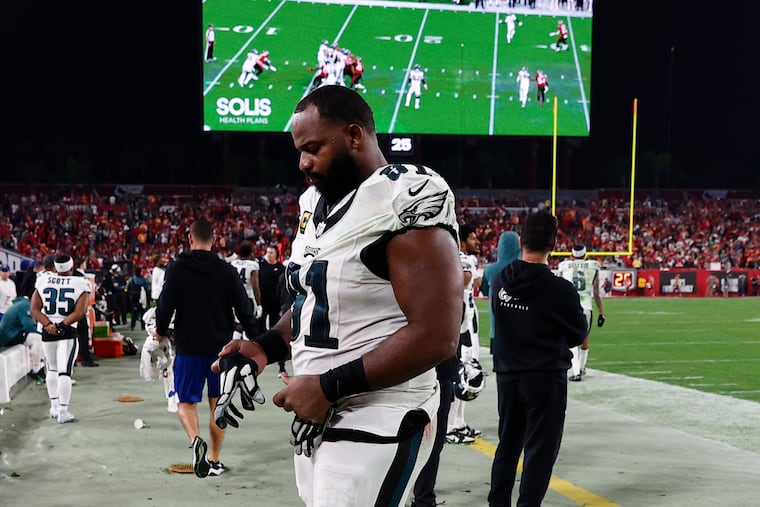Fletcher Cox changed the game. The Eagles need to find some true disruptors to replace him.
Fletcher Cox was an indispensable player for the Eagles for more than a decade. That says a lot about Cox — who changed the game at DT — and a little about the Eagles.

The amazing thing about Fletcher Cox is his sack numbers.
They are amazingly unremarkable.
Bear with me here. I come here not to bury Fletch but to praise him. Not that he needs it. The resumé speaks for himself: four All-Pro honors, six straight Pro Bowl nods, 12 NFL seasons, all with the Eagles. When Cox announced his retirement on Sunday, the 33-year-old did so with every reason to consider himself as one of the best interior defensive linemen of his generation.
In a weird way, the numbers I’m about to rattle off are just as much as a testament. I’ll explain in a bit. First, let’s play a game of did-you-know.
Did you know that Cox’s highest single-season sack total ranks as the 122nd most prolific by a defensive tackle, according to Pro-Football-Reference? Did you know that those 10½ takedowns in 2018 are also the only time he reached double digits in his career? Aaron Donald has done it six times. Randy White did it five times. Warren Sapp did it four.
» READ MORE: Jalen Hurts was a different quarterback this season. The big question for the Eagles is why.
Did you know that Cox walks into retirement with 70 career sacks, a total that ranks outside the top 20 all-time among defensive tackles? That’s less than half of all-time leader Alan Page (148½).
Did you know that in order to reach White’s 111 career sacks, Cox would need to play four more seasons with a better average sack total than he posted in his prime?
If you are like me, you didn’t know any of that. Because you didn’t need to. At least, not until you needed some quantifiable evidence for the glowing tribute you were about to write.
Therein lies the point. You didn’t need to think about Cox’s sack totals because his impact on the field so obviously transcended such a reductive benchmark. He was a disrupter, a wrecking ball in gargantuan human form, smasher of pockets, collapser of holes, responsible for more sleepless Saturday nights than True Detective Season Four.
Don’t get me wrong. Cox walks away from the NFL with plenty of sacks. Only nine players have more of them since 2012, when the Eagles drafted him out of Mississippi State at No. 12 overall. The only pure defensive tackles with more of them over the last 20 years are Donald, Cam Heyward, Chris Jones, and Ndamukong Suh. And, frankly, you can argue whether several of those guys should really count as pure defensive tackles. Which only reinforces the point.
Cox wasn’t just a game-changer. He was an era-changer. When he arrived in the NFL 12 years ago, defensive tackles had all the visibility of an early-afternoon talk show. They were space-eaters, ground-holders, double-team-absorbers. Throughout the 1980s and into the late-’90s, the NFL was a two-gap world where the big boys up front were largely responsible for keeping the linebackers clean to hunt the running back. As recently as 2005, NFL offenses averaged 203.5 passing yards per game. In Cox’s rookie season, they averaged 231.5.
Then, the revolution occurred. Play-callers like Bill Walsh and Andy Reid realized that the best way to attack traditional defenders was by untraditional means. Spread ‘em out, make ‘em move, keep ‘em guessing. Play fast. It didn’t take long for NFL offenses to gain the upper hand.
Enter Cox.
He wasn’t the first of his kind. But he was among the first of his time. First came Suh and J.J. Watt. Then came Cox and Donald. Over a five-year stretch, the NFL bore witness as the first wave of a new freakish form of athlete entered the league. Combine tackle-grade strength and center of gravity with an edge-grade first step and lateral quickness, then watch the chaos ensue.
Cox shifted the paradigm as much as any of them, combining a defensive end’s pass-rushing prowess in the four-technique over guard with the ability to take on double teams and melt the strong side of a run formation on contact. He was as active and omnipresent in between the tackles as any player had been. Cox may have fallen short of the level of singular dominance achieved by the rest of that group, but he played as big of a role as any in changing the league’s understanding of what a defensive tackle can and should be.
If I had to guess, we’ll end up looking back at Fletcher Cox as more of a pioneer than the Greatest of All Time. And that’s perfectly fine. You look at Jones, at Justin Madubuike, at Quinnen Williams, at Jalen Carter, you see in part the realization of the value of disruption in the middle.
Whatever Cox was, he was above all else one of the few common variables in two Eagles Super Bowl berths. Howie Roseman and Nick Sirianni would be wise to keep that in mind as they look to move past the Great Crash of 2023. Cox has been a near-indispensable part of the Eagles defense for longer than most players are in the league. That says a lot about Cox, but a lot about the Eagles, too.
Disruption is what’s important, regardless of position. Find any great defense and you’ll find a world-class disrupter in the middle, literally or figuratively. With Cox, it was literal. That was easy to see.